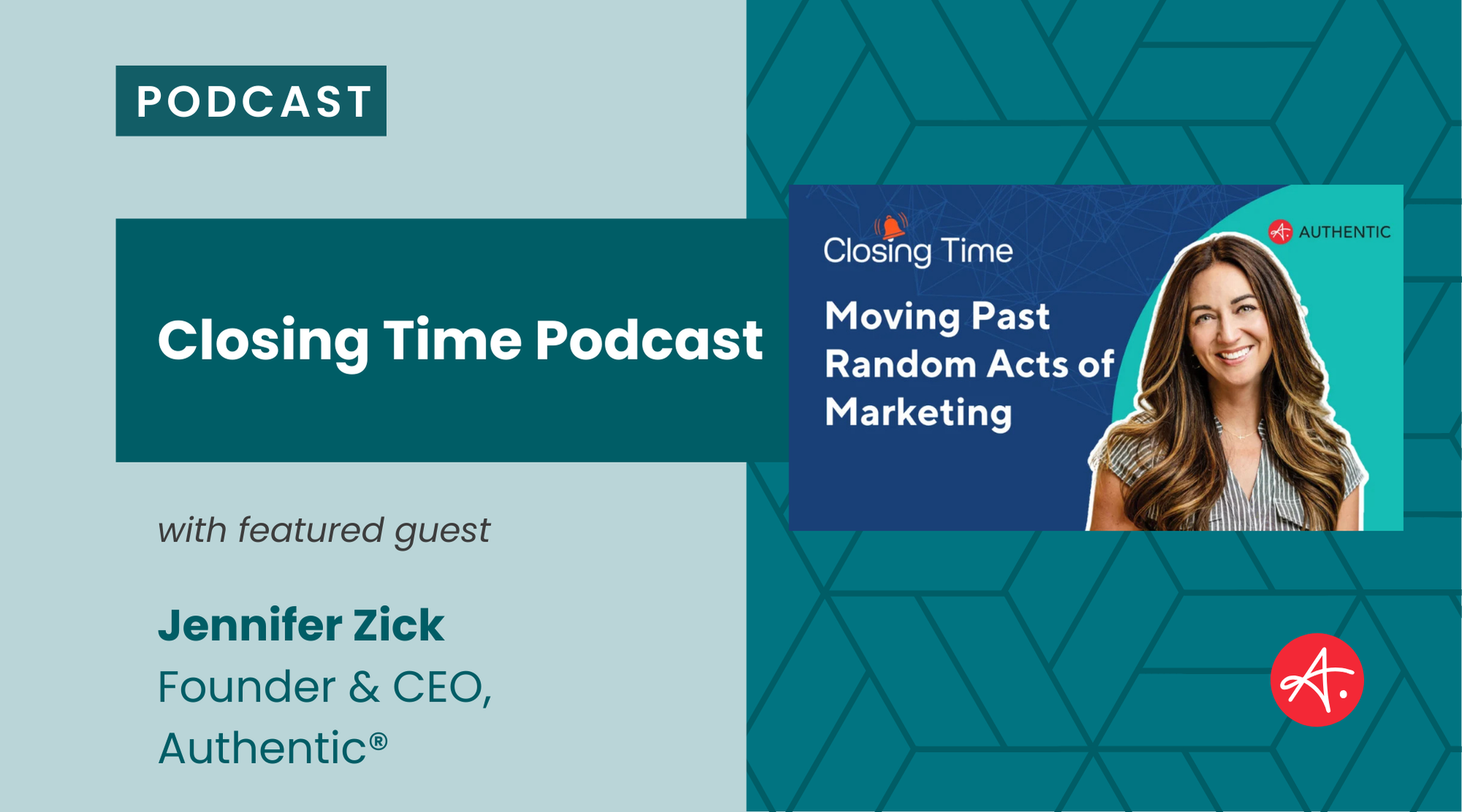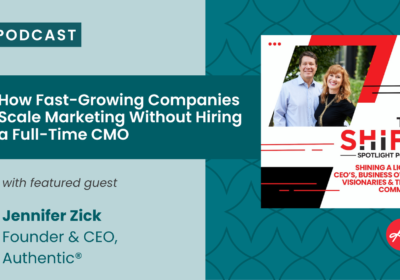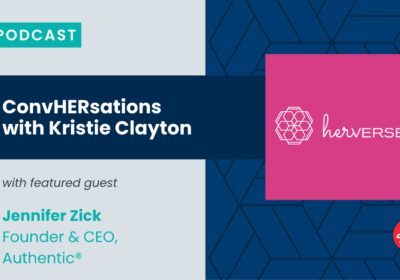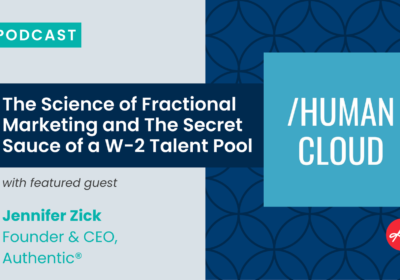Random Acts of Marketing: Move Past it to Make Your B2B Marketing Strategy Work FOR You
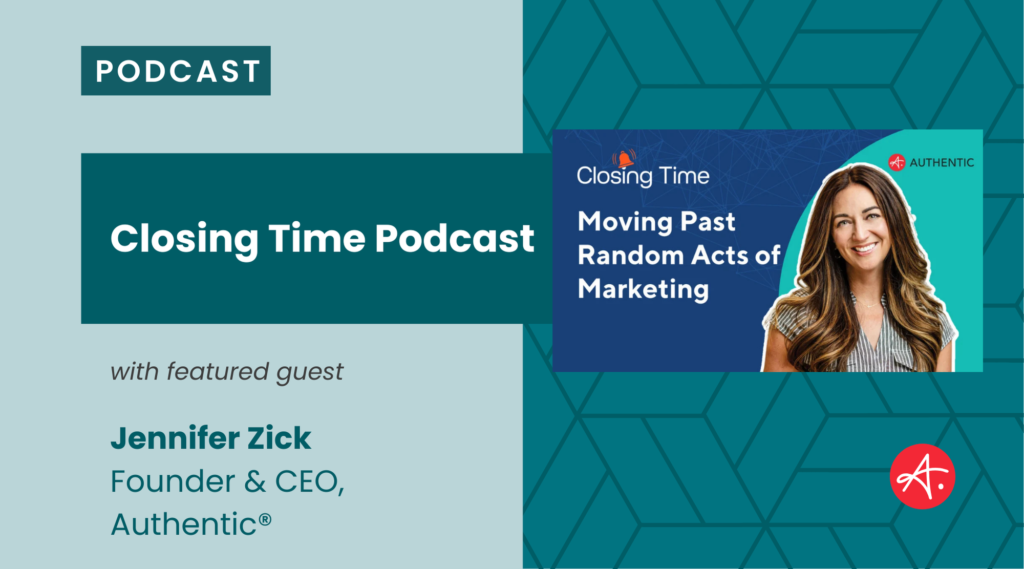
Our founder and CEO, Jennifer Zick, was recently the featured guest on the Closing Time podcast with host Chip House.
Jennifer shared the importance of building a solid marketing foundation that includes your key messaging strategy and your unique value proposition. Additionally, Jennifer discussed tips on how you can add marketing as a strategic partner to your go-to-market plans.
Jennifer joined Closing Time to help B2B marketing leaders understand how to Overcome Random Acts of Marketing® and move toward a marketing strategy that drives businesses forward.
Listen to the Podcast
Watch the Conversation
Key Takeaways
- Jennifer explains why early-stage businesses often fall into scattered marketing behaviors as they iterate toward market fit — and how scaling requires more focus and strategic leadership.
- Jennifer introduces Authentic’s audit and assessment process: a strategic SWOT analysis that quickly identifies marketing strengths, gaps, and a clear path forward for execution.
- Success starts with deeply understanding who you want to matter to and why. Jennifer shares how focusing on your ICP leads to stronger messaging, more effective campaigns, and better revenue results.
- Modern marketing doesn’t end at lead generation — it builds trust, drives retention, and nurtures customer advocacy.
- Jennifer highlights how AI will reshape marketing, but human connection remains at the center. Future marketing teams must lead with curiosity, continuous learning, and strong communities.
Full Episode Transcription
Introduction and Background
Chip House: Do you feel like your go-to-market is more like random acts of marketing? We’re going to talk about a more planful approach in this episode of Closing Time. Thanks for tuning in to Closing Time, the show for go-to-market leaders. My name is Chip House. I’m the CMO of Insightly CRM. And today, I’m joined by Jennifer Zick, who is CEO and Founder of Authentic®, a community of fractional chief marketing officers. Welcome to the show, Jen.
Jennifer Zick: Thanks, Chip. I’m really glad to be here.
Chip House: Hey, Jen, before we kick in, do you want to just tell us a little bit more about Authentic?
Jennifer Zick: I would be glad to. I started Authentic in 2017 without even knowing the term “fractional CMO.” I just knew that there had to be a better way to help small, growing businesses move further, faster with marketing strategy. I wanted to create a pathway through bringing experienced marketing leadership to the table on a part-time, flexible basis. That led me down the path of discovering fractional as a category and becoming one of the pioneers in the fractional CMO space.
Defining Random Acts of Marketing
Chip House: That’s great. And that’s why I wanted to talk about this today, because you and your fractional CMOs work with hundreds of companies. One thing that’s clear is a general problem with marketing. A lot of programs seem disorganized — maybe not planful — almost random. You’ve even trademarked the term Overcome Random Acts of Marketing® Tell me more about what that means.
Jennifer Zick: That’s right. It might sound like a bit of an insult, but honestly, it’s a compliment. Every business goes through a natural evolution as they grow. At Authentic, we work with hundreds of businesses across the U.S. and beyond, typically past the $5M revenue mark and growing. They’re often founder-led, sales-driven, and starting to achieve critical mass.
Getting to that stage means you’ve done a lot of experimentation. You’ve taken hypotheses, refined them, trialled and errored different messaging, tested different markets — and you’re starting to find fit. That experimentation leads to random acts of marketing. But to truly scale, you need to reorganize, put energy into a focused go-to-market strategy, and build a sustainable, sales-aligned marketing engine.
The Authentic Growth® Methodology
Chip House: That makes a ton of sense. And I can definitely see how founders, you know, focus on building a product, building a go-to-market, definitely building a sales team. Can I sell this as the founder? Do we have product-market fit? How are customers getting success from our product? And marketing becomes maybe 40th on their list, right?
Even if they hire a marketing person, their initial trials with marketing are probably pretty random. Okay, so that moves us into — what do you do about it?
Jennifer Zick: When I started Authentic, I knew we needed to bring both the wisdom of experienced marketing leadership and a consistent approach to the table. We call it our Authentic Growth® Methodology.
When our fractional CMOs onboard with a client, we’re stepping onto a moving train. They’re doing a lot of good things, but they’re often not confident that, when it comes to marketing, they’re doing the right things in the right way, in the right order, with the right budget and resources, to get the right outcomes.
We use our methodology, which has evolved through contributions from all of our CMOs, to quickly audit and assess. We gather quantitative and qualitative data from revenue teams and leaders to assess strengths, gaps, and build a foundational marketing action plan. That plan accelerates results and sets the stage for ongoing strategic evolution.
Assessing Metrics and Maturity
Chip House: Yeah, I’m super interested in that. It makes sense you’d start with metrics. So, I assume you’re looking at overall marketing performance — who you’re selling to, revenues, average deal size, which channels are working, what the messaging looks like. What else are you drilling into?
Jennifer Zick: There’s data, but there’s also the team’s self-assessment on maturity across different attributes. We start with the assumption that we might walk into situations where data isn’t mature or even captured.
Some clients have great systems and processes to create baseline data and intelligence. Most are a mixed bag. So, inside our foundational work, we’re looking at things like: What’s your Ideal Customer Profile (ICP)? What’s the brand that will resonate? What’s your go-to-market message foundation?
Then we look at technology, systems, processes, data, KPIs — across all of those. Most companies have been doing some of it but need to pull it all together to the next level.
Founders and sales leaders often resist narrowing their ideal client fit because they’ve been living in “any revenue is good revenue.” But at the scaling stage, you have to focus on healthy, happy growth revenue — to build a sustainable business.
Focusing on the Ideal Customer and Strategic Messaging
Chip House: Yeah, totally. As a marketer who’s been doing this for a while too, that’s always where I want to start: What do we sell, and who are we selling to? What’s their pain, where do they hang out, how do they get information? ICP is always the first place to start.
I love some of the questions you ask: Who do we want to matter to? Why should we matter to them? Can you talk more about that?
Jennifer Zick: For sure. Every time I speak with a new prospect, the conversation usually starts at the tactical level:
- “Should we be doing more on Instagram?”
- “Should we do more trade shows?”
- “Should we cut paid media and invest in content?”
But I can’t answer tactical questions without leveling up first.
If I showed you a one-page snapshot of what a CMO builds using our Authentic Growth® framework, at the very top would be “Purpose.” Why do we exist? At the very bottom is tactics: what we implement.
In between is everything foundational: ICP, brand, messaging, process, tech, data, KPIs, activation through channels.
It can be overwhelming. So, we simplify it:
Great marketing fundamentally answers:
- Who do we want to matter to?
- Why should we matter to them?
- Where is their natural habitat?
- And when we get there, how do we build trust?
Too many brands go straight to “sell, sell, sell,” but it’s about establishing trust. Building brand credibility so that when they’re ready to buy, they think of you.
From Trust to Tactical Execution
Chip House: Yeah, I love that. And when I think about entering any market, first someone has to know you, like you, and trust you. You need a good idea of who you’re trying to appeal to — and ideally, a lofty vision and purpose for existing.
That cascading method you talk about makes a ton of sense.
One of the things you work on a lot, I’m sure, is messaging. So once you’ve identified those fundamentals — ICP, purpose, habitat — how does that help you build messaging? What does that messaging workshop look like?
Jennifer Zick: When I first launched Authentic, messaging workshops were a required part of onboarding. Now, our methodology has evolved. Sometimes, we realize we need to address foundational issues like business goals or brand purpose before diving into messaging.
Also, not every CMO is a messaging expert. CMOs are orchestrators — like conductors of the orchestra. They see the big picture, from purpose to execution. They bring in the right specialists when needed.
We’re not an agency — we’re marketing leaders. So we’ve curated a network of ally partners, true experts in things like brand messaging. We often bring them in for messaging work.
Sometimes, that means doing voice-of-customer research or stakeholder interviews. Understanding the market, identifying what we’re aiming at, assessing the available opportunity — and then crafting messaging from there.
We even hired one of our allies to work on Authentic’s own messaging. Because as we like to say: It’s hard to read the label when you’re inside the bottle.
We all get too close to our own brand. Having that outside perspective is invaluable.
Founders and Messaging Blind Spots
Chip House: Yeah, 100%. Objectivity is so important — especially with founders. They’re often the most locked in to how they’ve always sold something.
We’ve run messaging exercises at Insightly, starting with research into market pain points, so we can better solve for what people are really facing — not just what we think they need.
Jennifer Zick: Yes. Especially if the founder created the original purpose or hypothesis. I can speak for myself — when I started Authentic, I had a ton of passion and a clear sense of what I wanted to offer. But as a company gains shape and scale, others need to be able to sell the value, not just the founder.
Your audience needs a message that feels like common sense for the problem they have and how you solve it. The founder is usually the last person who should try to create that content. Their role is to infuse vision and passion — not write the actual copy.
Beyond Lead Gen: Marketing’s Strategic Role
Chip House:
One more thing we’ve seen — in a lot of organizations, marketing gets pigeonholed. Maybe they’re seen as the people who make brochures for sales. Or they’re running basic lead gen — top-of-funnel stuff — but it’s not strategic. How do you help move them beyond that?
Jennifer Zick: It requires a shift in mindset and a deeper understanding of what modern marketing really is.
Depending on the company’s maturity, marketing tends to get stuck in one of two lanes:
- “They make things pretty and spend money.”
- “They generate leads and toss them to sales.”
But marketing — especially in B2B — is the connective tissue of the brand. Early on, yes, demand gen is a priority because you need new business to survive. But as a business matures, retention, growth, and advocacy become equally important.
You need to flip and extend the funnel — to support every phase of the customer journey.
It’s still demand gen and sales enablement, yes. But it’s also:
- Post-sale brand experience
- Account management support
- Storytelling for customer success
- Creating advocacy
- Attracting and retaining talent
- Building stakeholder trust
Your brand isn’t just about what you sell — it’s about every promise you make and how people experience that promise.
Rethinking the Funnel: Hourglass, Bowtie, and Flywheel
Chip House: Yeah. I can tell you, as a CMO, I touch every area of the business. And that’s why new models like the hourglass funnel, the bowtie, or the flywheel make so much more sense.
It’s not just about getting a lead and handing it off. It’s a complete journey — building customers who become advocates.
A lot of founders probably don’t think that way when you first meet them, do they?
Jennifer Zick: No. And again, it’s because of that natural evolution.
Founder-led, sales-driven companies are winning deals and remodeling themselves as they go. Early on, you don’t have time to think about retention, expansion, product innovation. You’re just trying to survive.
It’s not until they reach a certain stage of critical mass that those things — retention, brand extension, diversification — become necessary for healthy growth.
Marketing becomes the thread tying all of that together: from the first brand promise through every customer touchpoint and beyond.
Looking Ahead: The Future of B2B Marketing
Chip House: We’ve talked to so many sales leaders on Closing Time, but it’s great talking marketing today.
So, looking ahead — what’s the 2024–2025 future for B2B marketing in your view?
Jennifer Zick: The biggest innovation space we’re talking about inside Authentic right now is AI.
We have a 24/7 Slack mindshare among our CMOs and meet weekly as a team. AI is a huge topic. Every business, at every size, is testing it — trying to figure out where it adds value, where it has limitations, and where it introduces liabilities.
Future marketing teams need to embrace experimentation. They need to be leaders, learners, and networkers — drawing on collective wisdom, adapting quickly, and staying curious.
Ultimately, we’re still selling human to human. That won’t change. But the skill set needed to leverage new technologies will. It’s evolving at an exponential pace.
AI and the Marketer’s Role
Chip House: Yeah, for me, AI is like having an R2D2 riding shotgun while I pilot the ship, right? Luke and R2 together.
Jennifer Zick: Exactly! AI should be a co-pilot — an augmentation tool — not the pilot itself.
And that balance of technology and human insight is going to be the mark of successful marketing leaders moving forward.
Closing Thoughts
Chip House: Jen, I’ve really enjoyed this conversation. Thanks so much for your time and sharing your insights.
Jennifer Zick: Thank you, Chip. It’s been a joy to spend time with you.
Chip House: It’s always great talking to another marketer — and a fellow Minnesotan, by the way.
And thanks to all of you for tuning in today. If you’d like to support the Closing Time podcast, please consider leaving a rating or review on whatever platform you’re using.
As always, head over to insightly.com/closingtime to learn more about today’s guest, and to find all episodes, links, and resources.
That’s all for this episode. See you next week on Closing Time.

